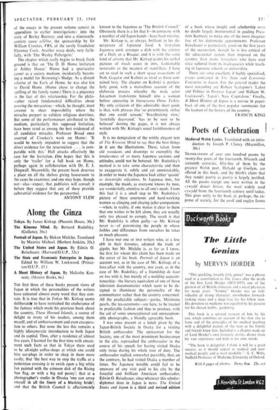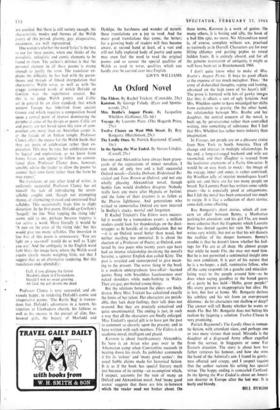Poets of Celebration I
Medieval Welsh Lyrics. Translated with an intro- duction by Joseph P. Clancy. (Macmillan,
30s.) .
TRANSLATIONS of over one hundred poems by twenty-five poets of the fourteenth, fifteenth and sixteenth centuries, fifty-five of them by the greatest Welsh poet, Dafydd ap Gwilym, are offered in this book, and the blurb's claim that they render poetry as poetry is largely justified. All the poems except one were written in the cywydd deuair hirian, the most widely used cywydd from the fourteenth century until today. This gives unity to the book at, perhaps, the ex- pense of variety, for the awdl and englyn forms
are avoided. But there is still variety enough, the characteristic modes and themes of the Welsh poetry of this period, gloomy, gay, vituperative, passionate, are well represented.
One wonders whether the word 'lyrics' is the best to use for these poems, when one thinks of the moralistic, eulogistic and comic elements to be found in them. The author's defence is that the personal element in all these poems' is strong enough to justify the term. The translator ex- plains the difficulty he has had with the paren- theses and threads of linked interpolation that characterise Welsh verse, as well as with the craggy compound words of which Dafydd ap Gwilym was the superlative creator. But this is to judge Welsh poetry and Celtic art in general by an alien standard, that which western Europe has inherited from ancient Greece and which requires a composition based upon a central point of interest dominating the peripheral areas of the design or poem. Celtic art and poetry are not based upon this view of com- position any more than an Anatolian carpet is, o- the facade of an Indian temple. Professor Clancy offers the excuse for the Welsh bards that they are poets of celebration rather than ex- ploration. This may be true, but celebration may be logical and exploration, as we know from James Joyce, can appear to follow no conven- tional plan. Professor Clancy does, however, sensibly advise the reader to allow the poems `to assume their- own form rather than the form he may expect.'
No translator, or any other kind of writer, is uniformly successful. Professor Clancy has set himself the task of reproducing the seven- syllable couplet and, though not attempting rhyme, of alternating stressed and unstressed final syllables. This occasionally leads him to slight distortion. In the first poem, Dafydd ap Gwilym's `Seagull.' the line 'Nun topping the rising tide' seems odd to me, perhaps because topping is too active a word. More literally it would be `A nun on the crest of the rising tide,' but this would give too many syllables. The inversion in line five of this poem is unnecessary. 'You are light on a sea-swell' would do as well as 'Light you are.' And the ambiguity in the English word light blurs the image here, where the Welsh word ysgafn clearly means weighing little, not that I suggest that as an alternative rendering. But this translation ends splendidly:
Gull. if you glimpse the fairest Maiden's cheek in Christendom. Should I win no sweet greeting, Ah God, the girl dooms me dead.
Professor Clancy is very successful, and ob- viously happy, in rendering Dafydd's comic and vituperative poems. 'The Rattle Bag' is tremen- dous fun. Dafydd's adventures in a tavern, his rejection at Llanbadarn church, his failures as well as his success in the pursuit of slim, fine- browed girls, the beauty of Morfudd and - Dyddgu, the harshness and wonder of nature; these translations are a joy to read. And the more good translations that come, the better; for a growing body of readers will thus become aware, at second hand at least, of a vast and still not fully explored body of poetry and some may even feel the need to read the original poems and so savour the special qualities of Welsh as used in verse, qualities which can hardly ever be carried over into English.
GWYN WILLIAMS



































 Previous page
Previous page